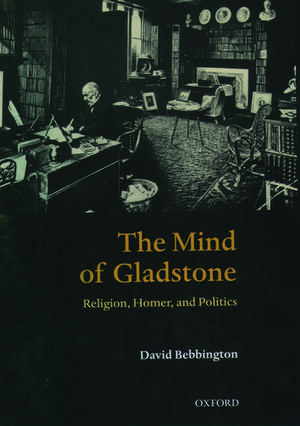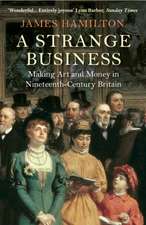The Mind of Gladstone: Religion, Homer, and Politics
Autor David Bebbingtonen Limba Engleză Hardback – 11 mar 2004
Preț: 980.18 lei
Preț vechi: 1488.43 lei
-34% Nou
Puncte Express: 1470
Preț estimativ în valută:
187.58€ • 192.10$ • 156.04£
187.58€ • 192.10$ • 156.04£
Carte tipărită la comandă
Livrare economică 08-14 martie
Preluare comenzi: 021 569.72.76
Specificații
ISBN-13: 9780199267651
ISBN-10: 0199267650
Pagini: 342
Dimensiuni: 162 x 242 x 24 mm
Greutate: 0.62 kg
Editura: OUP OXFORD
Colecția OUP Oxford
Locul publicării:Oxford, United Kingdom
ISBN-10: 0199267650
Pagini: 342
Dimensiuni: 162 x 242 x 24 mm
Greutate: 0.62 kg
Editura: OUP OXFORD
Colecția OUP Oxford
Locul publicării:Oxford, United Kingdom
Recenzii
... this important study, to which students of the 19th century will turn with gratitude for many years to come.
Bebbington's study is exceptional ... Bebbington leads his reader through a close, gracious, and clearly written analysis.
At the conclusion of his study Bebbington offers some stimulating reflections ... What Bebbington demonstrates in these final reflections is the significance of his work not only for a fuller understanding of Gladstone, but for the challenges faced in the deracinated and increasing multi-ethnic and multi-cultural liberal democracies of our own day.
The Mind of Gladstone has at least three virtues that its subject's works seldom exhibit: it is unfailingly lucid, it is not a word too long and it never strays into overarguing its case.
Aiming to study the great statesman 'from the inside out', the author succeeds in showing how religious and intellectual ideas provided the chief motivation throughout the complex and ever-changing political life. Although there have been earlier studies of Gladstone's formidable mind, this is by far the most comprehensive and thoroughgoing: making use if much unpublished material.'
Bebbington's study is exceptional ... Bebbington leads his reader through a close, gracious, and clearly written analysis.
At the conclusion of his study Bebbington offers some stimulating reflections ... What Bebbington demonstrates in these final reflections is the significance of his work not only for a fuller understanding of Gladstone, but for the challenges faced in the deracinated and increasing multi-ethnic and multi-cultural liberal democracies of our own day.
The Mind of Gladstone has at least three virtues that its subject's works seldom exhibit: it is unfailingly lucid, it is not a word too long and it never strays into overarguing its case.
Aiming to study the great statesman 'from the inside out', the author succeeds in showing how religious and intellectual ideas provided the chief motivation throughout the complex and ever-changing political life. Although there have been earlier studies of Gladstone's formidable mind, this is by far the most comprehensive and thoroughgoing: making use if much unpublished material.'











